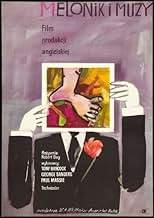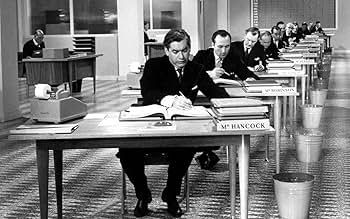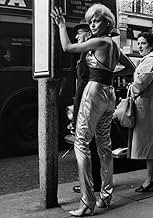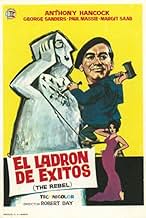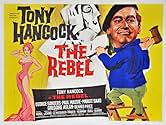The Rebel
- 1961
- 1h 45m
IMDb RATING
6.8/10
1.3K
YOUR RATING
Tony Hancock gives up his day job to become an artist. He's a lot of enthusiasm, but little talent, and critics dislike his work. Nevertheless, he impresses a talented artist.Tony Hancock gives up his day job to become an artist. He's a lot of enthusiasm, but little talent, and critics dislike his work. Nevertheless, he impresses a talented artist.Tony Hancock gives up his day job to become an artist. He's a lot of enthusiasm, but little talent, and critics dislike his work. Nevertheless, he impresses a talented artist.
- Nominated for 1 BAFTA Award
- 1 nomination total
Gary Cockrell
- Artist
- (as Gary Cockerill)
Featured reviews
This one is a long-time favourite for its great one-liners, its wit, its bright colours and the sheer joy of its performances. George Sanders plays the creepy critic with the same finesse he'd done many times before, Hancock as the leader of the Infantile school of painting is so preposterous its hysterical, even a very young Oliver Reed appears briefly in the cafe scene. The writing of Galton and Simpson is as sharp as ever but gets to take more detours and turns than it ever could in the Half-Hours ... a brilliant film. I particularly love the pathetic painting of the foot which crops up at the art exhibition and that hideous sculpture. Excellent.
Of course I am aware that huge numbers of people will see this movie as mildly diverting, an interesting off shoot of a TV character, or a strained attempt to translate a mythic television talent to a medium he wasn't suited to. I know some will find the plat slight. Some may enjoy it but simply feel it isn't all that impressive. Well, this is fine. But I believe that The Rebel is quite simply the finest movie ever made, and I've seen a lot of movies.
What is so great about it ? The colours. The lush score moving from the comic to the romantic with ease. The array of great comic performances. The script which ranges from the profoundly comic to the comically profound.
The struggle of the individual to express his individuality in a world that prefers conformity has been the subject of countless numbers of films. The Rebel is the only film I can think of to mock this tradition while also celebrating it. The character of Hancock drifts between lies and truth while carving out a reputation for himself among the Parisian avant garde. His never reflects on his complete lack of noticeable talent and inability to dedicate himself to the craft but instead creates something of a stir with his infantilism. His bluster is only ever a whisker away from the despair he shows on his opening train journey.
Comedies are often treated as somehow inferior to dramas. It's much more important to treat human suffering with a straight face than take life for the comedy it undoubtably is. Hancock's suffering may not on the face of it seem important or noble, but it is the despair of the insignificant man who wants to be outside of the machine, wants to be important and creative. But despite dealing with this theme the comedy never drifts into pathos. Hancock covers the sadnesses with a jaunty self involvement in which he can place himself securely among the great artists whose every brush stroke is torn from their body.
The satire on modern art may seem a bit obvious but it is never played on for serious effect.
The sideline characters are all magnificent from John Le Mesurier as Hancock's completely unimaginative boss, through Irene Handl on top form as Mrs Cravat who regards all Hancock's efforts as a load of miscellaneous rubbish, to Dennis Price's Jim Smith, eccentric French millionaire.
"Jim Smith ?"
"Oh. You're surprised. I always feel an English name sounds so much more mysterious."
"Oh yes. I knew a Bert Higgins and a Harry Trubshaw once. They were dead mysterious they were."
But it's not just the plotting, the comedy, the acting, and the dialogue that strike me as perfection. The design of the movie. The contrasting of Parisian styles with the bowler hat and umbrellas of Waterloo Bridge. The interior of Paul Ashby's room. The paintings themselves. All these elements compound the sense of joy that watching this film brings.
And for those who watch this film and think that I am talking nonsense. All I can do is to re-iterate Hancock's cry to the elite of the art scene "You're all raving mad. None of you know what you're looking at. You wait til I'm dead. You'll see I was right."
What is so great about it ? The colours. The lush score moving from the comic to the romantic with ease. The array of great comic performances. The script which ranges from the profoundly comic to the comically profound.
The struggle of the individual to express his individuality in a world that prefers conformity has been the subject of countless numbers of films. The Rebel is the only film I can think of to mock this tradition while also celebrating it. The character of Hancock drifts between lies and truth while carving out a reputation for himself among the Parisian avant garde. His never reflects on his complete lack of noticeable talent and inability to dedicate himself to the craft but instead creates something of a stir with his infantilism. His bluster is only ever a whisker away from the despair he shows on his opening train journey.
Comedies are often treated as somehow inferior to dramas. It's much more important to treat human suffering with a straight face than take life for the comedy it undoubtably is. Hancock's suffering may not on the face of it seem important or noble, but it is the despair of the insignificant man who wants to be outside of the machine, wants to be important and creative. But despite dealing with this theme the comedy never drifts into pathos. Hancock covers the sadnesses with a jaunty self involvement in which he can place himself securely among the great artists whose every brush stroke is torn from their body.
The satire on modern art may seem a bit obvious but it is never played on for serious effect.
The sideline characters are all magnificent from John Le Mesurier as Hancock's completely unimaginative boss, through Irene Handl on top form as Mrs Cravat who regards all Hancock's efforts as a load of miscellaneous rubbish, to Dennis Price's Jim Smith, eccentric French millionaire.
"Jim Smith ?"
"Oh. You're surprised. I always feel an English name sounds so much more mysterious."
"Oh yes. I knew a Bert Higgins and a Harry Trubshaw once. They were dead mysterious they were."
But it's not just the plotting, the comedy, the acting, and the dialogue that strike me as perfection. The design of the movie. The contrasting of Parisian styles with the bowler hat and umbrellas of Waterloo Bridge. The interior of Paul Ashby's room. The paintings themselves. All these elements compound the sense of joy that watching this film brings.
And for those who watch this film and think that I am talking nonsense. All I can do is to re-iterate Hancock's cry to the elite of the art scene "You're all raving mad. None of you know what you're looking at. You wait til I'm dead. You'll see I was right."
An often overlooked and underrated Hancock vehicle as the Lad from East Cheam inadvertently becomes the toast of the art world when his flatmate's paintings are accidentally attributed to him instead of his own primitive childish daubs.
Great ensemble cast with John Le Mesurier as his boss, the sublime Irene Handl as his landlady Mrs Cravat and George Sanders as his pompous artistic agent.
At the films' centre is a sharp and nicely played critique of the hypocrisy and snobbishness of the art world with the usual taut Galton and Simpson script full of smart one liners.
"What's that?" asks Mrs Cravat looking at a bright pink picture of a man in a beret. "It's a self portrait" replies Hancock. "Who of?" counters Mrs Cravat.
Look out for a very young Nanette Newman as an Existentialist acolyte in the party scene and also Oliver Reed as a cafe artist.
8/10
Great ensemble cast with John Le Mesurier as his boss, the sublime Irene Handl as his landlady Mrs Cravat and George Sanders as his pompous artistic agent.
At the films' centre is a sharp and nicely played critique of the hypocrisy and snobbishness of the art world with the usual taut Galton and Simpson script full of smart one liners.
"What's that?" asks Mrs Cravat looking at a bright pink picture of a man in a beret. "It's a self portrait" replies Hancock. "Who of?" counters Mrs Cravat.
Look out for a very young Nanette Newman as an Existentialist acolyte in the party scene and also Oliver Reed as a cafe artist.
8/10
It was a natural step for Tony Hancock in attempting to become successful in the medium of cinema. He longed for success in America and the only way he might have achieved this, was by making tailor-made films. "The Rebel" was the result. The year of the film's release - 1961, saw Hancock at the peak of his popularity in Britain. At one stage, about 23% of the British population were either tuning into his radio series or were watching him on television. Such an achievement is seldom. "The Rebel" is a very good effort and I always enjoy the film. For the first time in his distinguished career, Hancock appeared in technicolour after four years of performing in black and white. I shall forever recall my inital surprise and slight bewilderment at seeing this comedy legend in colour. It took me a while to adapt to seeing Hancock in anything except monochrome. The story wisely has the comedian playing the same character of 23 Railway Cuttings and with the identical character traits. Hancock is wanting to better himself after feeling he has denied himself his true potential and calling in his life. He has endeavours in wanting to become a painter and so, he leaves his job as an office clerk and moves to Paris. Whilst there, "The Lad Himself" meets a fellow struggling artist and they share digs, hoping that success might beckon. It does but in ways Hancock never expected...... I am glad that Ray Galton and Alan Simpson wrote the script as who better to write for Hancock than those two individuals? The comedian collaborated with the writers on the story and whose name is listed during the opening credits under story. There are some great scenes here, such as watching Hancock attempting to paint various buildings around Paris, befriending the Avant Garde characters, getting mixed up with a criminal mob and other highlights. Watching "The Rebel," I sense a kind of loneliness with Hancock in his character. The way he has no family to speak of, not many friends, feeling somewhat dissatisfied with his lot in life, embarking upon his adventures in Paris alone and not knowing a single soul in France anywhere. However, he comes across as self-reliant, independent and determined to realise his dream as an artist. This film would mark the final time that Tony Hancock worked with Ray Galton and Alan Simpson. One of the most talented and successful collaborations in British comedy history would draw to a close. The film did respectable business at the British box office and a Gala reception was held in London for the films release. Unfortunately, America took little notice. Their loss! I highly recommend this film to anyone who is a fan of Hancock or of British comedy in general.
Despite the fact that it's written by Tony himself with Galaton and Simpson's assitance, and that it's beginning and ending are set at the hotel where Hancock resided in the last season, this film feels quite different from "Hancock's Half hour".
However it overcomes it's shortcomings, has a good number of laughs with snappy one-liners and makes me look foward to seeing "The Punch and Judy man" ( another Hancock film ).
7.5/10
( Rated G/U due to the absence of offensive content )
However it overcomes it's shortcomings, has a good number of laughs with snappy one-liners and makes me look foward to seeing "The Punch and Judy man" ( another Hancock film ).
7.5/10
( Rated G/U due to the absence of offensive content )
Did you know
- TriviaThe film was a critical and commercial disaster in the United States.
- GoofsWhen the two bodyguards appear on the luxury yacht their shirts are buttoned and unbuttoned showing vests underneath.
- Crazy creditsThe producers wish to acknowledge the fullest co-operation accorded - somewhat apprehensively - by BRITISH RAILWAYS.
- ConnectionsEdited into Urban Myths: Les Dawson's Parisienne Adventure (2020)
- SoundtracksAt Last ! At Last !
(L'Âme des Poètes)
(uncredited)
Music by Charles Trenet
French lyrics by Charles Trenet
English lyrics by Florence Miles
- How long is Call Me Genius?Powered by Alexa
Details
- Release date
- Country of origin
- Languages
- Also known as
- Call Me Genius
- Filming locations
- Bingham Road railway station, Addiscombe, Croydon, London, England, UK(Fortune Green South Station)
- Production company
- See more company credits at IMDbPro
- Runtime1 hour 45 minutes
- Aspect ratio
- 1.66 : 1
Contribute to this page
Suggest an edit or add missing content


